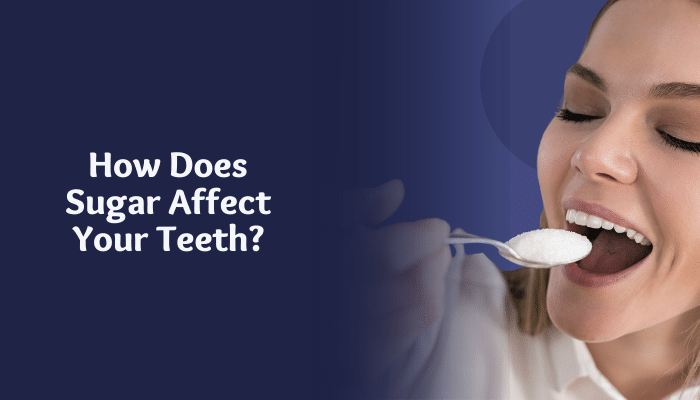We are trying to learn more and more about how consuming a lot of sugar can wreak havoc on your overall health. Also, if you’ve heard how sugar can be devastating to your teeth and oral health,
But, with all these warnings, have you heard the reason why sugar can be harmful and how does sugar effect your teeth? Sugar is essential to so many foods and beverages we consume, so it’s vital to understand why you should stay away from them. The following are several effects of sugar on teeth and the ways in which sugar is awful for your oral health and what you can do about it.
Your mouth as a battleground
Your mouth is the entry point for most of what you put into your body. All the food (energy) and drinks (hydration) you eat enter through your mouth, so your mouth acts as a battleground between beneficial and harmful bacteria. Many studies have shown that a portion of these harmful bacteria produce acid in your mouth whenever they encounter and digest sugar. That means each time you consume sugar, these bacteria are producing more acid that destroys your teeth.
Your saliva battles this damage, but consuming a lot of sugar means there’s more acid than your spit can handle alone. The repeated process of acid attacks on your teeth causes mineral loss in the sparkling, protective layer around your teeth called the enamel. In the long run, this acid weakens and destroys the enamel and results in a cavity.
Sugar changes the acidity in your mouth
Streptococcus mutans and Streptococcus sobrinus are the two types of destructive bacteria found in the human mouth. The two types of bacteria feed on sugar and form plaque, which is the sticky substance dentists clean from your teeth during your normal visit. If this plaque is allowed to settle on your teeth and isn’t cleaned away by brushing or spitting, it will ultimately become acidic and eat away the enamel on your teeth.
Sugar attracts bad bacteria
Along with creating enamel-eating acids, sugar draws in the tiny bacteria that cause gum disease and gingivitis. These infections can cause your gums to recede away from your teeth and destroy the protective tissues that hold your teeth in place.
Solid sugars’ effects on teeth
Sugar is in a greater number of foods than you realize. There are natural sources of sugar, similar to fruits, vegetables, and honey, but you can also consume sugar by eating common tidbits like chips and cookies. Foods containing high amounts of white processed sugar are especially harmful because they leave a sticky residue on your teeth that are excessively difficult for your salivation to wash away. The best way to eliminate this residue is by brushing, flossing, mouthwash, and dental cleaning.
While you should practice moderation in all sugar consumption, frequent snacking on food varieties high in sugar increases the time your teeth are exposed to the dissolving effects of these acids. This results in tooth decay.
Sugary drinks’ effects on teeth
Drinking sugar drinks can have a more devastating effect on your teeth than eating sugary sweet foods. Along with sugar intake, many beverages, like soft drinks, have their own acidity that is awful for your teeth, along with the acids created by sugar. As per a study conducted in Finland and published in 2014, drinking a couple of sugar-sweetened beverages daily was linked to a 31% higher risk of cavities forming in your teeth.
Beverages containing high fructose corn syrup are particularly harmful. This sweetening substance, which is found in numerous soft drinks and sugar-sweetened drinks, covers your mouth in toxins and creates a sticky film over your entire mouth. Bacteria breed on this film, and create acids, resulting in cavities.
Sugary foods and beverages that cause tooth decay
There is sugar in many foods and beverages you eat, and it might be overwhelming to find a way to free yourself from unnecessary sugar from your diet. However, you can start with the most unsafe form, processed or refined sugar, similar to the kind found in candy, ice cream, potato chips, pre-packaged snacks, and soda. Instead, try to consume foods rich in fiber and protein. Strong teeth are a result of foods like nuts, cheese, and leafy greens.
Also, vegetables like carrots and celery are far better for your teeth in that they normally remove plaque and bacteria from the outer layer of your teeth. Drinking a lot of water during and after eating promotes saliva production and cleans your mouth of bacteria and food particles.
While consuming a lot of sugar is detrimental to your oral and overall health, consuming a sugar substitute called xylitol can help with cavity-causing bacteria. This sugar-alcohol substance is normally found in sugar-free gum, sugar-free mints, and various types of toothpaste.
Family Dentistry at Vistadent
Sugar is so prevalent in the food varieties and beverages we consume that it can feel overwhelming to try and eliminate it from our diet. But now that you realize exactly how bad sugar can be for your oral health, start with simple steps like eliminating refined, processed sugar, or high fructose corn syrup. By changing your diet and eliminating these sugars, you can drastically reduce the risk of developing issues with your teeth.
Are you ready for clean, strong teeth? Practical, everyday dental care can be simple, and we need to be your guide as you create durable, effective practices for your diet, dental, and overall health needs. At Vistadent, we provide family dentistry services to help with keeping your friends and family’s smiles strong and healthy. We provide caring, attentive, and respectful dental treatment, from routine checkups to extensive dental repairs with the latest state-of-the-art technology.
For more information about effects of sugar on teeth or teeth treatment as well as other dental problems, contact Vistadent Orthodontic Speciality Clinic, at 040-23388111 or +91 9866572482 or at info@vistadent.net or visit our website at http://vistadent.net/.

